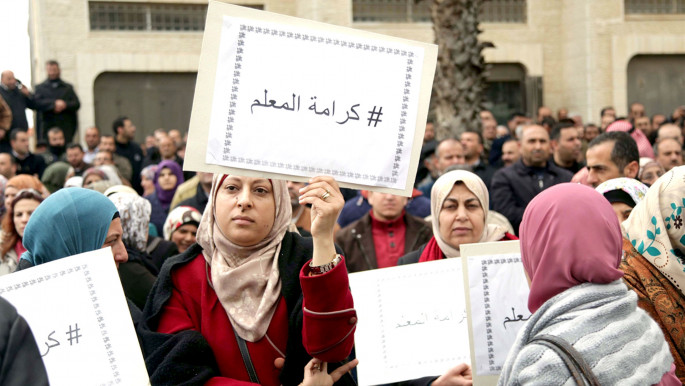Thousands of teachers protest in Ramallah, defying PA security
The demonstration follows two weeks of protests by teachers that included a school strike of more than three days.
Palestinian police were deployed across Ramallah, where the Fatah-dominated Palestinian Authority is headquartered, to block busloads of teachers from joining the demonstration outside the headquarters of the Palestinian cabinet.
Although police succeeded in blocking parts of the demonstration, around 8000 teachers made it to the sit-in, saying they would continue their strike until demands are met.
The teachers say the Palestinian Authority has not fulfilled a 2013 pledge to give them a 10 percent raise - which would only be in line with inflation.
"We held a sit-in last Tuesday but no one has communicated with us since then," said Saad Awwad, a teacher coordinator of the strike in Nablus, referring to the 20,000 strong protest last week.
"Despite them trying to prevent us to reach the cabinet, we were able to rally to emphasize our demands," he said.
 |
|
| Palestinian teachers demanding dignity in Ramallah [Getty] |
There were also multiple reports of Palestinian security officers issuing threats to withdraw the licenses of bus drivers if they transport teachers to Ramallah.
"The strike continues as long as there is disregard and denial for the right of teachers," he added.
Awwad called for the Fatah Central Committee to accept the resignations of the heads of the teachers union that were presented on Sunday.
The union heads resigned after a deal they struck with the Palestinian Authrotiy last week was broadly rejected by the teachers.
There were reports that the union heads were recieving bribes from the PA.
The general secretary of the teachers union, Ahmed Suhail, had accused the protesters of being affiliated with Hamas.
However, Awwad denied that there was any political aspect to the strike, saying that the aims were to simply gain teacher's rights.
As the teachers union operates on a quota system, the party that represents the largest section - Fatah - heads the union.
The party, that dominates the Palestinian Authority, will therefore get to appoint a new union head.
Without the leadership of the union, the teachers have set up local coordination committees to build the strike and protests, and has gained legitimacy and weight.
 |
|
| At least 8000 teachers turned up to demonstrate [Getty] |
The PA is going through a severe fiscal crisis and is struggling to pay government employees.
Teachers make up the largest group of public sector employees and say their salaries are meager in comparison to others.
The Palestinian Independent Commission for Human Rights issued a statement saying that the security measures taken by the PA represent an "illegal and unwarranted restriction on the freedom of movement, opinion and expression and freedom of peaceful assembly."
The commission said these actions complicate the crisis and called on the PA to strop preventing the teachers from protesting.
Considering the PA has often come under fire for overt security cooperation with Israel and has limited powers in the face of the occupation, its inability to pay wages opens it up to fresh criticism.
Also on Tuesday, civil servants in the Hamas administered Gaza Strip declared a strike to protest against unpaid salaries, which are also the responsibility of the PA.
The chief rival of Fatah brought in their own public sector workers following the groups takeover of Gaza in 2007.
However Gazan civil servants continue to receive an erratic salary from Ramallah, sometimes receiving as little as 40 percent of what is owed to them.



